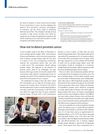4 citations,
March 1968 in “The Lancet” Avoiding aspirin may prevent hair loss.
3 citations,
September 2021 in “EClinicalMedicine” ALRV5XR effectively increases hair density in men with androgenetic alopecia without adverse effects.

New treatments for hair loss, including a compound called "ALRV5XR", platelet-rich plasma, and Adult Stem Cell-based therapy, are showing promise, but more trials are needed for confirmation.
 3 citations,
April 2002 in “The Lancet”
3 citations,
April 2002 in “The Lancet” Painful hair loss in an elderly woman was caused by giant cell arteritis, not just aging.
 3 citations,
July 1997 in “The Lancet”
3 citations,
July 1997 in “The Lancet” Finasteride may increase hair growth and prevent baldness in men, but can cause sexual side effects.
 2 citations,
March 2023 in “The Lancet. Respiratory medicine”
2 citations,
March 2023 in “The Lancet. Respiratory medicine” Long COVID is a serious, long-lasting illness that needs more recognition and support.
 2 citations,
August 2013 in “The Lancet. Diabetes & endocrinology”
2 citations,
August 2013 in “The Lancet. Diabetes & endocrinology” The FDA rejected a testosterone drug again due to safety concerns.
 2 citations,
December 2006 in “Lancet Oncology”
2 citations,
December 2006 in “Lancet Oncology” Finasteride significantly reduces PSA levels in men, and doctors should adjust PSA readings for those taking the drug.
 2 citations,
October 1990 in “The Lancet”
2 citations,
October 1990 in “The Lancet” Some people have a genetic variation that makes them less effective at breaking down drugs.
 1 citations,
July 1997 in “The Lancet”
1 citations,
July 1997 in “The Lancet” Scientists found a new protein, AMY117, common in Alzheimer's patients, which could be important for treatment and diagnosis.
 1 citations,
October 1990 in “The Lancet”
1 citations,
October 1990 in “The Lancet” Using minoxidil for hair growth may cause skin lesions in some people, and taking breaks from nitrate patches for angina might worsen symptoms.
 1 citations,
November 1983 in “The Lancet”
1 citations,
November 1983 in “The Lancet” Acute leukemias with the Philadelphia chromosome may be biphenotypic, and identifying this is important for proper treatment.
1 citations,
November 1947 in “The Lancet”  June 2021 in “EBioMedicine”
June 2021 in “EBioMedicine” The authors maintain that shorter androgen receptor alleles may lead to milder COVID-19 by positively affecting the immune response, not due to changes in testosterone levels or activity.
 February 2007 in “Lancet Oncology”
February 2007 in “Lancet Oncology” Using a single PSA level to decide on a prostate biopsy is not effective; a more personalized approach considering various factors is recommended.
 December 2006 in “Lancet Oncology”
December 2006 in “Lancet Oncology” The document concludes that better training and education are needed for proper cancer screening and criticizes the GMC's inaction as harmful to clinical ethics in the UK.
 July 1997 in “The Lancet”
July 1997 in “The Lancet” Finasteride increased hair count and regrowth in men with hair loss but also caused more sexual side effects than placebo.
 July 1997 in “The Lancet”
July 1997 in “The Lancet” A new protein linked to Alzheimer's was discovered, and a hair loss treatment showed effectiveness but had some sexual side effects.

A woman successfully sued for not being told about a medication's side effects, emphasizing doctors' duty to inform patients.

The books were useful but had some areas needing improvement.

A bald man grew hair on his head after taking a drug called diazoxide, but lost it again when he stopped the medication.
 February 1961 in “The Lancet”
February 1961 in “The Lancet” Some new drugs show potential for treating blood cancers but have serious side effects and need more research.
 January 1953 in “The Lancet”
January 1953 in “The Lancet” Alopecia areata's causes are unclear, treatments exist but relapses are common.
 January 1953 in “The Lancet”
January 1953 in “The Lancet” Cortisone may help hair regrow by altering the local environment, with regrowth starting 3-4 weeks after treatment, but its use is not widely recommended.
 374 citations,
May 2016 in “The Lancet. Diabetes & endocrinology”
374 citations,
May 2016 in “The Lancet. Diabetes & endocrinology” Cushing's syndrome can cause serious health problems, and early treatment is crucial, but some issues may remain after treatment.
 210 citations,
November 2015 in “The Lancet HIV”
210 citations,
November 2015 in “The Lancet HIV” PrEP for HIV is less effective in transgender women mainly due to low adherence to the treatment.
 89 citations,
December 2006 in “Lancet Oncology”
89 citations,
December 2006 in “Lancet Oncology” Taking 1 mg/day finasteride for hair loss significantly lowers PSA levels in men, which may affect prostate cancer screening.
 192 citations,
September 2003 in “The Journal of clinical endocrinology and metabolism/Journal of clinical endocrinology & metabolism”
192 citations,
September 2003 in “The Journal of clinical endocrinology and metabolism/Journal of clinical endocrinology & metabolism” Metformin is effective for treating excessive hair growth in women with PCOS and may work better than the standard treatment in some ways.
 August 2022 in “Journal of Contemporary medical practice”
August 2022 in “Journal of Contemporary medical practice” Combining Traditional Chinese Medicine and Western medicine can improve symptoms, hormone levels, and pregnancy outcomes in Polycystic Ovary Syndrome patients, but more research is needed.
 1 citations,
January 2020 in “The Egyptian Journal of Plastic and Reconstructive Surgery”
1 citations,
January 2020 in “The Egyptian Journal of Plastic and Reconstructive Surgery” PRP or nanofat injections improve scar tissue quality but don't significantly boost hair transplant results for scarring hair loss.


























